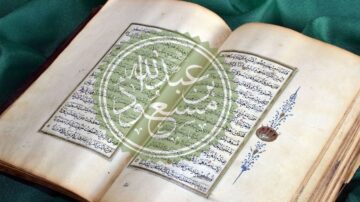When still a youth, not yet past the age of puberty, he used to roam the mountain trails of Makkah keeping far away from the people, and tending the flocks of a Quraysh chieftain, `Uqbah ibn Mu`ayt. People called him “Ibn Umm `Abd”, the son of the mother of a slave. His real name was `Abdullah and his father’s name was Mas`ud.
The youth heard the news of the Prophet who had appeared among his people but he did not attach any great importance to it both because of his age and because he was usually far from Makkan society. It was his custom to go with the flock of `Uqbah early in the morning and not return until nightfall.
One day while tending the flocks, `Abdullah saw two dignified looking, middle-aged men coming towards him from a distance. They were obviously very tired and were so thirsty that their lips and throat were parched. They came up to him, greeted him and said, “Young man, milk one of these sheep for us that we may quench our thirst and recover our strength.”
“I cannot,” replied the young man. “The sheep are not mine. I am only responsible for looking after them.”
The two men did not argue with him. In fact, although they were extremely thirsty, they were also exceedingly pleased at the honest reply. The pleasure showed on their faces . . .
In fact, the two men were the blessed Prophet himself (peace and blessings be upon him) and his companion, Abu Bakr As-Siddiq. On that day, they had gone to the mountains of Makkah to escape the violent persecution of the Quraysh.
The young man in turn was impressed with the Prophet and his companion and soon became quite attached to them.
It was not long before `Abdullah ibn Mas`ud became a Muslim and offered his service to the Prophet (peace and blessings be upon him). The Prophet agreed and from that day the fortunate `Abdullah ibn Mas`ud gave up tending sheep in exchange for looking after the needs of the blessed Prophet.
`Abdullah ibn Mas`ud remained closely attached to the Prophet and would attend to his needs both inside and outside the house. He would accompany him on journeys and expeditions, wake him when he slept, shield him when he washed and carry his staff and siwak (toothbrush) and attend to his other personal needs.
Abdullah ibn Mas`ud received a unique kind of training in the household of the Prophet. He was under the guidance of the Prophet (peace and blessings be upon him), he adopted his manners and followed in his footsteps until it was said of him, “He was the closest to the Prophet in character.”
Abdullah was taught in the “school” of the Prophet. He was the best reciter of the Qur’an among the companions and he understood it better than all of them. He was therefore the most knowledgeable about the Shari`ah.
`Abdullah ibn Mas`ud was not only a reciter of the Qur’an, but he was also a learned man and a sincere worshipper. As well as this, he was a strong and courageous fighter; one who could become deadly serious when the occasion demanded.
One day, the companions of the Prophet were together in Makkah. They were still few in number, weak and oppressed. They said, “The Quraysh have not yet heard the Qur’an being recited openly and aloud. Who is the man who will recite it for them?”
“I shall recite it for them,” volunteered `Abdullah ibn Mas`ud.
“We are afraid for you,” they said. “We want someone who has a clan who would protect him from their ill treatment.”
“Let me,” `Abdullah ibn Mas`ud insisted, “Allah shall protect me and keep me away from their evil.” He then went out to the mosque until he reached Maqam Ibrahim (a few metres from the Ka`bah). It was dawn and the Quraysh were sitting around the Ka`bah. `Abdullah stopped at the Maqam and began to recite:
(In the name of Allah, the Most Beneficent, the Most Merciful. The Merciful. He has taught the Qur’an. He has created man and taught him the clear truth . . .)
He continued reciting and the Quraysh looked at him intently and some of them asked:
“What is Ibn Umm `Abd saying?”
“Damn him! He is reciting some of what Muhammad brought!” they realized.
They went up to him and began beating his face as he recited. When he returned to his companions, the blood was flowing from his face.
“This is what we feared for you,” they exclaimed.
“By Allah, ” replied `Abdullah, “the enemies of Allah are not more comfortable than I at this moment. If you wish, I shall go again tomorrow and do the same.”
“You have done enough,” they decided. “You have made them hear what they dislike.”
Abdullah ibn Mas`ud lived until the time of Caliph `Uthman, (may Allah be pleased with him). When he was sick and on his death-bed, `Uthman came to visit him and said,
“What troubles you?
“My sins.”
“And what do you desire?”
“The mercy of my Lord.”
“Shall I not give you your stipend which you have refused to take for all these years?
“I have no need of it.”
“Let it be for your daughters after you.”
“Do you fear poverty for my children? I have commanded them to read the Chapter of Al-Waqi`ah every night for I e heard the Prophet saying, ‘Whoever reads Al-Waqi`ah every night shall not ever be effected by poverty.

